In celebration of Women’s history Month, Fair Play Talks interviews Business Disability Forum’s CEO Diane Lightfoot – a diversity champion who’s not only pushing for disability confidence and inclusion in the UK, but worldwide. In this interview, she tells Pepi Sappal why disability inclusion is fast rising up the corporate agenda, and how organisations can become ‘disability confident’ through best practice.
Although Diane Lightfoot has been CEO of the Business Disability Forum (BDF) for the last three years, she has been working in the disability space for more than 16 years. Her goal is to help businesses and organisations promote disability inclusion and confidence both in the UK, and internationally.
“Globally companies are increasingly committing to disability inclusion. Some 86% firms have either signed up to a pledge, such as Valuable 500, or have a corporate definition about what disability inclusion means to them,” confirms Lightfoot. “However, only 23% have a disability inclusion strategy that’s actually in existence and resourced. So most companies are at development stage.”
INTERNATIONAL CHALLENGES
For international companies, the challenges of disability inclusion are far more wide-ranging and complex, than national companies, points out Lightfoot. “The most commonly cited challenges mainly revolve around cultural differences regarding how disability is understood in different regions/countries, as well as how companies engage with disability both within the business, as well as the wider infrastructure. For example, those businesses who want to intentionally hire more people with disabilities, may find that in some countries, people who have a disability don’t always have the same access to education and/or opportunities, so the pipeline of talent is not always there to tap into.
“Then, of course, you have varying country legal requirements, where you either can/can’t – or have to by law – ask about disability. The other main challenge is the lack of a common language to discuss disability, which boils down to the organisation’s culture. So our upcoming global report will really help to unpick some of these issues. However, the main message for business leaders of global companies, is to not to let the fear of tackling something so large and complex be the reason for avoiding it.”
Her advice: “Focus on the intention and not perfection, because it’s a long journey. It’s about staring with small wins in the short-term. We suggest making a start – even if it’s small steps. There are so many large organisations in the same boat, so you’re not alone – it really is about sharing best practice and learning from each other.”
BDF’s global research on the state of disability inclusion (carried out in association with Shell), is due out in May.
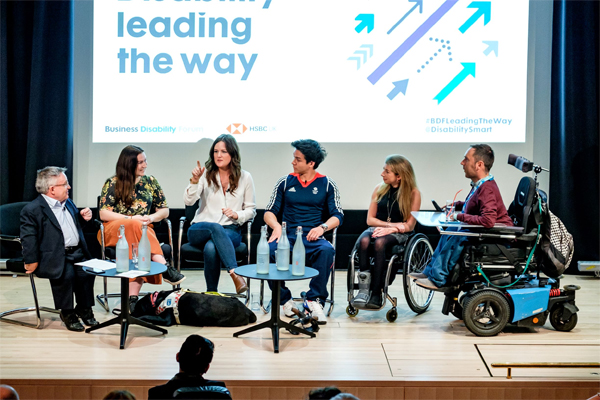
UK BEST PRACTICE
On a positive note, Lightfoot believes that the UK is leading in disability inclusion best practice. “Overall, there is cause for optimism and positivity. There actually is lot of really good practice in the UK. The 300+ businesses that we work with are committed to getting it right. They range from big private sector companies, the major banks and major government bodies who collectively employ about 20% of the UK workforce.”
According to Lightfoot, the UK’s high street banks currently score high in disability inclusion: “For example to achieve our Gold Disability Standard, firms have to score over 90% by providing evidence and commitment of disability inclusion across all areas of their business. Banks such as Barclays, Lloyds, RBS have all scored over 90%, which is no easy feat for organisations of any size.”
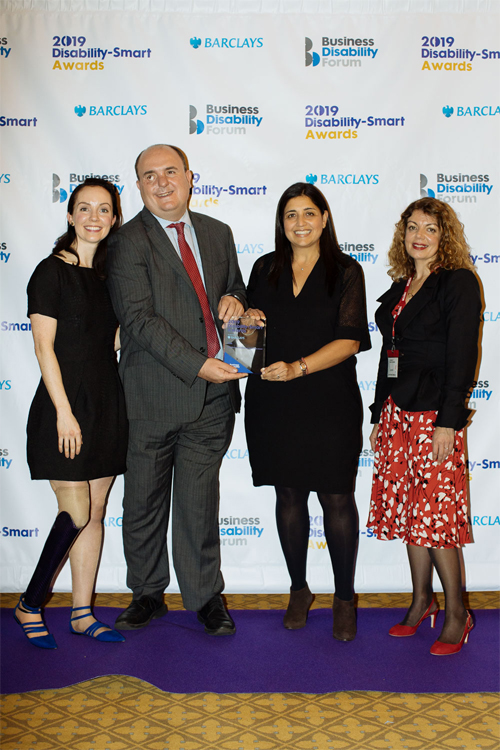
AWARD-WINNING PRACTICES
She also highlights last year’s BDF award winners, such as Shell, which won the Disability Smart Multinational Award for the “sheer breadth of work across all aspects of disability rights across all its global operations”. Herbal Essences, owned by P&G, won the Disability Smart Design Award for a tactile feature on its shampoo and conditioner bottles, so people who are blind or have a vision impairment can distinguish between them when they are in the shower. “It was actually an idea from an employee that is blind, which demonstrates how something so simple in concept can actually be so life changing for so many,” explained Lightfoot. “There are so many wonderful examples of good practices like that.”
In fact, over the last 18 months, Lightfoot has noticed a really encouraging shift from UK firms simply focusing on just retaining people with a disability to actually wanting to attract people with a disability. “We are now starting to get more queries from companies about how to attract disabled talent and how to ensure their recruitment processes are barrier free. That’s hugely encouraging because they are starting to see the business benefits of including people with disabilities. They are not just doing it because it’s the right thing to do morally and ethically, but also because they are realising that if they have a diverse workforce that includes disability, and people with different life experiences, they are better able to reflect their customers’ – and society’s – needs. This can also be a point of brand differentiation for them,” she explains.
“MI5’s Director General Sir Andrew Parker who joined us to pick up their award last year, couldn’t have said it better, when he said ‘to not want to include and attract disabled talent is bonkers, because those companies are losing out’,” she adds.
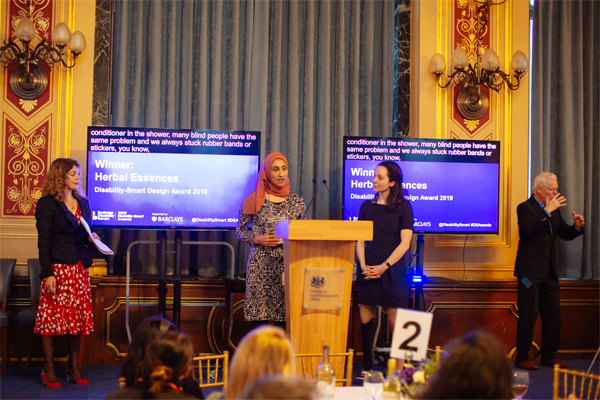
UK-SPECIFIC CHALLENGES
Nevertheless, although companies see the many benefits of recruiting and retaining disability, it’s still a hugely challenging area for many firms, confirms Lightfoot. One of the main challenges in the UK is around organisational culture and getting that leadership buy-in. “It can make a huge difference if you have a senior leader that talks openly about disability – and supports it. It sets the tone and a positive culture for creating a welcoming and inclusive workplace for people with disabilities,” she explains.
“The other challenge is having ‘confident’ managers who are capable of having the conversation with staff about what kind of support or adjustments they might need. You can have the best policies in world, but they won’t be effective if you don’t have line managers confident enough to tackle sensitive issues, or know where to go for practical support.”
Another hurdle for many managers is that they are dealing with a very broad and complex definition of disability. “When most people think of disability, many still assume it’s wheel chair users. Of course, they are still hugely important because even though it’s 2020, we still haven’t cracked physical accessibility,” according to Lightfoot. “But at the same time, it’s vital to remember that over 90% disabilities are not immediately visible. It’s an incredibly broad spectrum with huge complexities. The Equality Act also encompasses long-term health conditions, fluctuating conditions, mental health conditions, neuro-diversity and so on. So it’s a very complex area for managers to get their head around.
“On the one hand, they may not know that an employee, or customer that’s being served, has a disability, and on the other hand, you may have an employee who does not identify with the word disability/disabled, although in legislation they are actually defined as having a disability. So it’s a hugely challenging area for many. Of course, in turn, employees also need to be able to confide in their managers, but that depends on how supportive the environment is. That again, boils down to the cultural piece, where companies create an environment where people feel safe to talk about what they might need in terms of support or adjustments.”

REASONABLE ADJUSTMENTS
The adjustment process is another hugely challenging area for many businesses, confirms Lightfoot: “It’s a topic that we get most queries about. Top queries revolve around how to decide whether an adjustment is reasonable or not. Other enquiries revolve around disability data monitoring or how to design questionnaires to encourage people to admit to a disability or long-term illness. Another hot topic revolves around allowing assistance animals/therapy animals in the workplace – again revolving around ‘what’s reasonable’.”
When it comes to adjustments, “it’s really about having a really clear process, that’s centrally-owned and communicated to everyone across the business”, says Lightfoot. “Managers must know how to access support, and the policies must be well promoted to employees because sometimes they may not be aware of what kind of adjustments are possible, particularly if they are new to the business. It should also be visible to potential recruits, so they know how flexible/open to accommodate adjustments your organisation is. So, from a practical perspective, a robust communications process across the board is a must.”
Although companies must obviously comply with the Equality Act, Lightfoot says BDF encourage companies to focus on best practice, as opposed to just seeking to meet legal obligations. “Rather than get hung up about whether a specific condition meets the strict requirement/definition of the Equality Act, our stance is, if you can provide that support – say a new chair to alleviate a bad back, or flexible hours for an employees who suffers from anxiety and therefore can’t travel during peak hours as a result – then accommodate it if you can. The emphasis should very much be on best practice.”
More information on the type of adjustments that UK companies are grappling with can be accessed here.
PRICE OF ADJUSTMENTS
Sometimes organisations worry about the additional cost of hiring someone with a disability, but in reality the vast majority are inexpensive, points out Lightfoot. “So things like flexible work arrangements, or having a quiet space in the office don’t really cost anything to implement. Assistive tech kits are often relatively inexpensive too,” she explains. “When expensive adjustments are needed, say physical adjustments to create wheel chair access, businesses have access to Government Access to Work funding to help with those costs. Funds are awarded on a sliding cost depending on the size of the firm. So for smaller companies, the government may well pick up the entire cost for adjustments.”
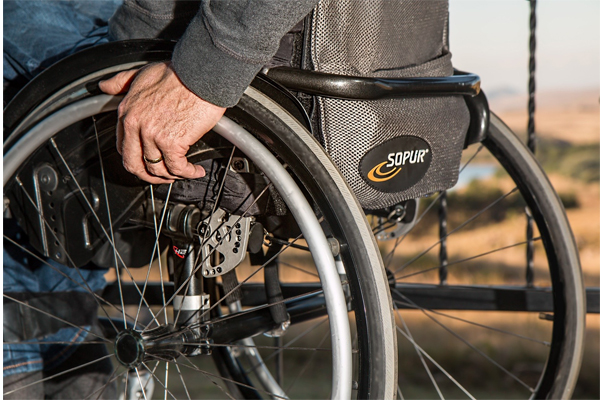
The challenges for SMEs differ from large firms, she adds: “For example, they don’t usually have dedicated resource like the bigger players, but on the flip side they are able to be much more flexible.” BDF is also starting a project, funded by the City Bridge Trust in London, to provide dedicated free disability inclusion advice and support for SMEs in London, which Lightfoot is very excited about because “collectively they are major employer in the UK”, she says.
INSPIRING BEST PRACTICE
In fact, several of BDF’s members are doing some inspiring, leading edge work in terms of good best practice, confirms Lightfoot. “For example, many have a central pool for funding adjustments, which helps to get around tight departmental budgets. Some companies are reframing the terminology used for disability, which helps take away the need to ask why an employee may need an adjustment. So, for example, flexible working policies can be used by someone who can’t get to work early because of extreme anxiety at peak times, or because they can’t get a wheel chair onto the train during rush hour. However, it’s also equally accessible to working parents/carers,” she explains.
“Similarly quite a lot of companies are starting to reframe assistive technology as ‘productivity tools’. So, for example, speech to text software can be used by an employee with dyslexia, as well as by staff members who have to write a lot of reports who can’t touch type or like to dictate whilst on the move. So taking away the need to say why an individual may need an adjustment can make a huge difference. And it’s truly inspiring to see what members are doing to make a difference to people’s lives at work.”
It’s not just about making physical adjustment – it’s also about communication and attitudes, points out Lightfoot. “So it’s vital for managers not to immediately jump to conclusions regarding how someone is responding/behaving, and acknowledge that something else might be going on,” she advises.
2020 DISABILITY AGENDA
Although many firms are doing great things, a lot of companies (both UK-based and international) still have a long way to go, and BDF has many resources to help them achieve disability confidence. “We are excited about our collaboration with Valuable 500. They have done brilliant work to engage and get the buy-in and commitment of senior leaders to put disability on the boardroom agenda. Our work is to help organisations operationalise this, and turn that high level commitment to practical action on the ground,” explains Lightfoot.
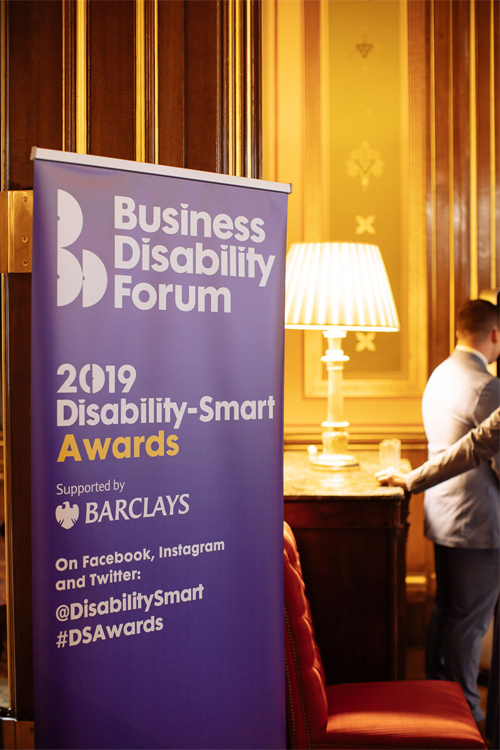
Lightfoot and BDF’s task force also help to influence the disability agenda nationally. One of the themes for this year is ‘What does disability look like in 2020?’. Like many other organisations, BDF has had to postpone its annual Spring conference, and re-planning it for the Autumn. But it will continue the business disability and inclusion conversation through a series of online webinars and debates, entitled Business Disability Debates, to help shape the agenda for the next event.
“Our next event aims to explore how far we’ve come 10 years on from the Equality Act and 25 years on from Disability discrimination Act. We will explore whether those pieces of legislation are still fit for purpose, as well as what it means to be disabled in 2020, and whether we need a new definition,” she adds. “We will also explore whether people consider themselves to have a disability and what they think of that word.”
For more information on upcoming webinars and future events, as well as BDF’s many resources/expert advice on disability inclusion, click here.





































